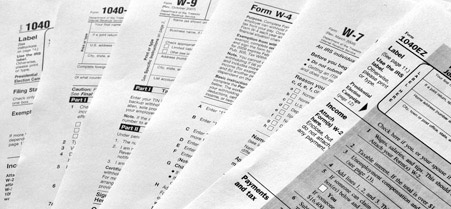Identity thieves will rake in billions in stolen tax refunds this year
 Shutterstock.com
Shutterstock.com
The fourth paragraph of this story was changed to clarify the scope of fraud detected in 2011.
Illegal tax refunds, including some forged by IRS employees, are paid more often than they are caught, IRS' watchdog is expected to tell lawmakers on Thursday morning.
"Identity theft cases have not been prioritized during the standard tax return filing process," states the prepared testimony of J. Russell George, the Treasury inspector general for tax administration. "We have found that the issuance of fraudulent tax refunds based on false income documents is significantly greater than the amount detected and prevented by the IRS."
He is slated to appear before the House Oversight and Government Reform Subcommittee on Government Organization, Efficiency, and Financial Management, two days after the deadline for filing annual tax returns.
Data thieves, along with hackers and deceitful tax preparers, collectively tried to defraud the government of at least $14 billion during tax season 2011, according to federal officials.
A part time IRS data entry clerk was indicted in April 2011 for falsifying returns to steal $175,144, George said. Monica Hernandez, the employee, allegedly lifted information contained in IRS documents to forge taxpayer forms.
"Using this information to perpetrate a criminal scheme for personal gain negatively impacts our nation's voluntary tax system and generates widespread distrust of the IRS," George writes.
For the past five years, the IRS has received negative audits from the Government Accountability Office for ongoing security weaknesses that could compromise sensitive taxpayer information.
George noted that the IRS does not analyze much data from identity theft cases for patterns that could be followed to prevent future refund fraud.
On Thursday, IRS officials are expected to testify that investigators are on track to spend 450,000 hours probing identity theft this year, double the time they dedicated to such crime in 2011.
"The IRS is committed to improving its approaches to blocking these fraudulent refund claims," states the prepared testimony of Steven Miller, IRS deputy commissioner for services and enforcement. "We strive to process returns in such a way that potentially false returns are screened out at the earliest possible stage."
To better help IRS catch crooks before refunds are issued, Congress must authorize regulators to read wage information listed in a database called the National Directory of New Hires, George recommended. Today, regulators may access the directory, which is a Health and Human Services Department system, only for returns claiming an earned income tax credit. The tax agency has inserted a request for legal access to the directory in its fiscal 2013 budget proposal to lawmakers.
IRS officials report that, using existing anti-fraud tools, the agency stopped $1.4 billion in refunds from being sent to identity thieves in 2011. Both the inspector general and the IRS point to the success of new data filters in flagging bogus forms before funds are paid. As of March 9, new screening mechanisms that spot certain changes in a taxpayer's circumstances had halted 215,000 suspicious files claiming refunds of $1.15 billion collectively, according to Miller.
Nina Olson, the Treasury-appointed independent national taxpayer advocate, will testify that clamping down on identity theft, while a worthy goal, may delay tax returns to valid filers.
"IRS identity theft filters will never be perfect," says her prepared statement. "If we decide to place a greater value on protecting taxpayers against identity theft and the Treasury against fraudulent refund claims, the IRS will need more time to review returns and the roughly 110 million taxpayers who receive refunds will have to wait longer to get them."
Or, the IRS could hire a significantly larger staff to review questionable returns faster, Olson said. "There is no way around these tradeoffs," she states.
( Image via Shutterstock.com )






